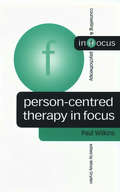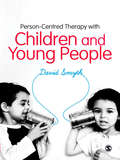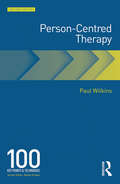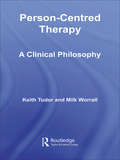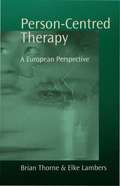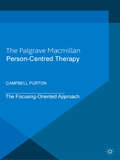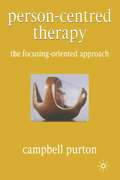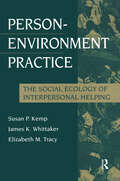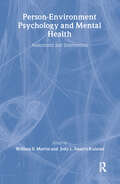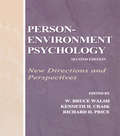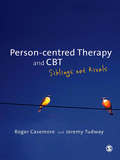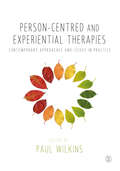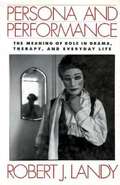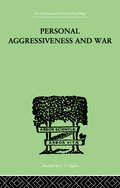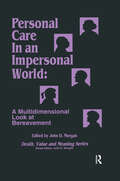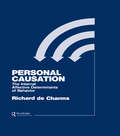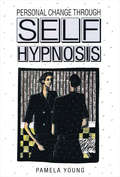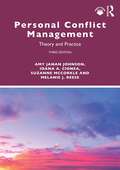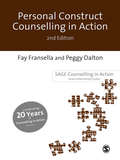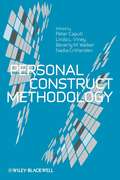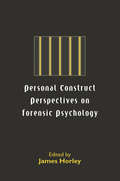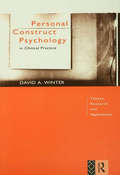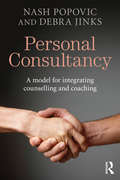- Table View
- List View
Person-Centred Therapy in Focus (Counselling & Psychotherapy in Focus Series)
by Paul WilkinsPerson-Centred Therapy in Focus provides a much-needed exploration of the criticisms levelled against one of the most widespread forms of therapeutic practice. Characterized by its critics as theoretically `light', culturally biased and limited in application, until now the person-centred approach has had comparatively little written in its defence. Paul Wilkins provides a rigorous and systematic response to the critics, drawing not only on the work of Carl Rogers, but also of those central to more recent developments in theory and practice (including Goff Barrett-Lennard, Dave Mearns, Jerold Bozarth, Germain Leitauer and Brian Thorne). It traces the epistemological foundations of person-centred therapy and places the approach in its social and political context. Examining the central tenets of the approach, each chapter sets out concisely the criticisms and then counters these with arguments from the person-centred perspective. Chapters cover debates in relation to: - the model of the person - self-actualization - the core conditions - non-directivity - resistance to psychopathology - reflection, and - boundary issues. Person-Centred Therapy in Focus fulfills two important purposes: firstly to answer the criticisms of those who have attacked the person-centred approach and secondly to cultivate a greater critical awareness and understanding within the approach itself. As such it makes a significant contribution to the person-centred literature and provides an excellent resource for use in training.
Person-Centred Therapy with Children and Young People
by David SmythThis engaging new book presents a ′child-centred′ model of therapy that is thoroughly person-centred in its values. Establishing the roots of child-centred therapy in both child development theories and the Rogerian model, David Smyth demonstrates that counselling the person-centred way is exceptionally relevant to young people. The book further develops child-centred therapy theory and practice, applying the model to real-life practice with children and young people, whether in play, school, organisations or with special needs groups. It also explores the complex professional issues so critical with this age group, including challenging boundaries, establishing an effective relationship with parents and other primary carers, legal and ethical considerations, and multi-professional practice. The author′s warm, accessible style conveys his passionate conviction that the person-centred approach can provide a strong foundation for child therapy practice. His book introduces humanistic counselling and psychotherapy trainees - as well as adult-trained therapists - to the particular requirements of working with children and young people, and also illustrates the value of using a ′child-centred′ approach for those who might already be working with children in mental health settings. Equally, this volume can be used for professional development in many disciplines including adult trained therapists who want to extend their knowledge of people prior to reaching adulthood.
Person-Centred Therapy: 100 Key Points (100 Key Points)
by Paul WilkinsPerson-centred therapy, rooted in the experience and ideas of the eminent psychotherapist Carl Rogers, is widely practised in the UK and throughout the world. It has applications in health and social care, the voluntary sector and is relevant to work with people who are severely mentally and emotionally distressed. As well as being a valuable sourcebook and offering a comprehensive overview, this edition includes updated references and a new section on recent developments and advances. The book begins with a consideration of the principles and philosophy underpinning person-centred therapy before moving to a comprehensive discussion of the classical theory upon which practice is based. Further areas of discussion include: The model of the person, including the origins of mental and emotional distress The process of constructive change A review of revisions of and additions to person-centred theory Child development, styles of processing and configurations of self The quality of presence and working at relational depth Criticisms of the approach are addressed and rebutted and the application of theory to practice is discussed. The new final section is concerned with advances and developments in theory and practice including: Counselling for Depression The Social Dimension to Person-Centred Therapy Person-Centred Practice with People experiencing Severe and Enduring Distress and at the ‘Difficult Edge’ A Review of Research Throughout the book, attention is drawn to the wider person-centred literature to which it is a valuable key. Person-Centred Therapy will be of particular use to students, scholars and practitioners of person-centred therapy as well as to anyone who wants to know more about one of the major psychotherapeutic modalities.
Person-Centred Therapy: A Clinical Philosophy (Advancing Theory in Therapy)
by Keith Tudor Mike WorrallThe person-centred approach is one of the most popular, enduring and respected approaches to psychotherapy and counselling. Person-Centred Therapy returns to its original formulations to define it as radically different from other self-oriented therapies. Keith Tudor and Mike Worrall draw on a wealth of experience as practitioners, a deep knowledge of the approach and its history, and a broad and inclusive awareness of other approaches. This significant contribution to the advancement of person-centred therapy: Examines the roots of person-centred thinking in existential, phenomenological and organismic philosophy. Locates the approach in the context of other approaches to psychotherapy and counselling. Shows how recent research in areas such as neuroscience support the philosophical premises of person-centred therapy. Challenges person-centred therapists to examine their practice in the light of the history and philosophical principles of the approach. Person-Centred Therapy offers new and exciting perspectives on the process and practice of therapy, and will encourage person-centred practitioners to think about their work in deeper and more sophisticated ways.
Person-Centred Therapy: A European Perspective (Living Therapies Ser.)
by Brian Thorne Elke Lambers`In this scholarly book, Thorne and Lambers have gathered together significant contributions to the advancement of person-centred theory and practice from leading exponents of the approach in Austria, Belgium, Germany, The Netherlands, Norway and the United Kingdom.... I found the book both stimulating and challenging. The insight it offers into working with "difficult" clients is invaluable and the sections on theory stretched me in my understanding of the approach. I strongly recommend it to anyone from within or without the person-centred tradition who wants to achieve a real understanding of the approach "post Rogers" and get to grips with the vibrancy and vitality of person-centred thought in Europe′ - Counselling and Psychotherapy, The Journal of the British Association for Counselling and Psychotherapy This book brings together up-to-date contributions to the development of person-centred theory and practice from leading European practitioners. The book makes available for the first time in English some of the most significant theoretical ideas and practical applications of a distinguished group of contributors at the cutting edge of the approach. It also gives a valuable insight into a vibrant professional network whose members are making a significant impact on the European world of counselling and psychotherapy. Covering a wide range of person-centred issues, the book provides unique and challenging material that will act as a springboard for debate at many levels between experienced practitioners, supervisors, trainers and trainees.
Person-Centred Therapy: The Focusing-Oriented Approach
by Campbell PurtonSince its beginnings in the 1950s, the person-centred approach to therapy has developed in many ways. In this important new text, Campbell Purton introduces the 'focusing' approach of Eugene Gendlin. The book discussed Gendlin's theoretical innovations and their implications for clinical practice. It throws light on the relationship between the various schools of therapy, and on the relationship between therapy and such areas as ethics and spirituality. It will be essential reading for students and practioners of person-centred therapy.
Person-Centred Therapy: The Focusing-Oriented Approach
by Campbell PurtonSince its beginnings in the 1950s, the person-centred approach to therapy has developed in many ways. In this important new text, Campbell Purton introduces the 'focusing' approach of Eugene Gendlin. The book discussed Gendlin's theoretical innovations and their implications for clinical practice. It throws light on the relationship between the various schools of therapy, and on the relationship between therapy and such areas as ethics and spirituality. It will be essential reading for students and practioners of person-centred therapy.
Person-Environment Practice: Social Ecology of Interpersonal Helping (Modern Applications of Social Work Series)
by Elizabeth M. Tracy James K. Whittaker Susan P, KempPerson-Environment Practice addresses a core but long- neglected dimension in social work and human services practice; accurate environmental assessment and strategic environmental intervention. Despite the centrality of "person-environment" as a key construct in direct practice, the domain of environmental assessment/intervention has received relatively little systematic attention in the practice literature. For a variety of reasons, the core focus of direct practice assessment and change strategies has centered more on "person" than "environment." This book seeks to redress that imbalance. Ironically, the relative lack of attention to environmentally oriented practice persists even as current demands of practice fall increasingly under the rubric of what we here call "environmental intervention," defined as both action in the environment and the process of transforming individual and collective perspectives through critical analysis of the impact of environmental conditions. The authors argue that the ability to understand "environment" from the client's perspective and to function effectively in the environmental domain is central to many emergent areas of practice such as practice with extended families and personal networks, practice from a "strengths" perspective, and culturally competent practice. In Person-Environment Practice, the authors offer a coherent critique and overview of environmental assessment and intervention congruent with the demands of both newly emerging and established interpersonal helping approaches within social work's domain. Robert Halpern of the Erikson Institute for Advanced Studies in Child Development described the book as "as clear, thoughtful and subtle a discussion of how to consider the environment in interpersonal helping as I have seen in the literature" and Anthony Maluccio of Boston College called the book "a timely and exciting contribution, with appreciation and respect for social work practices and qualities of inspiration as well as intellectual stimulation" Susan P. Kemp is assistant professor, School of Social Work, The University of Washington, Seattle. James K. Whittaker is professor, School of Social Work, The University of Washington, Seattle. Elizabeth M. Tracy is associate professor, Mandel School of Applied Social Sciences, Case Western Reserve University, Cleveland, Ohio.
Person-Environment Psychology and Mental Health: Assessment and Intervention
by William E. Martin Jody L. Swartz-KulstadIn recent years, mental health professionals who have traditionally focused on the emotional state of the individual have come to realize that problems arise from the unique interactions between particular individuals and environments. From necessity, they are beginning to look at context; no longer can they place the responsibility for mental health on the shoulders of the person alone. Most attention has been paid to the impact of educational and work settings, but it is clear that all life settings contribute meaningfully to positive psychological adaptation and must be considered in any attempt to understand a person's difficulties. This book explores the crucial ramifications of new theory and research in person-environment psychology for assessment and intervention. All practitioners seeking to deliver effective mental health services to adolescents and adults will learn from it.
Person-Environment Psychology: New Directions and Perspectives
by Richard H. Price W. Bruce Walsh Kenneth H. CraikA variety of theoretical approaches to person-environment psychology has been developed over the years, representing a rich range of intellectual perspectives. This second edition links the past and present and looks toward the future in reviewing new directions and perspectives in person-environment psychology. Stated differently, the main thrust of this volume is to present contemporary models and perspectives that make some sensible predictions concerning the individual and the environment using the person-environment relationship. Within a person-environment framework, these models and perspectives are concerned with how people tend to influence environments and how environments reciprocally tend to influence people. Thus, this second edition presents new directions in person-environment psychology and the implications for theory, research, and application.
Person-centred Therapy and CBT: Siblings not Rivals
by Mr Roger Casemore Jeremy TudwayWhy do I need to learn about CBT and/or the Person-centred Approach? What can these techniques contribute to my counselling training and practice? This book has some of the answers, showing humanistic, CBT and integrative therapists how to get to grips with each other's approaches. CBT has become more fully present in the therapeutic landscape and therapists from other modalities are increasingly being required to understand or even train in the approach. Responding to this growing pressure for change, Person-centred therapist Roger Casemore joins forces with Jeremy Tudway. Together they show how counsellors can respect and value each other's approaches by more clearly understanding the similarities and differences in theory, philosophy and practice. They clarify how therapists draw upon this knowledge in their practice without betraying the values of their core approach. This book is recommended for anyone studying Person-centred or CBT modules on counselling & psychotherapy courses, or experienced practitioners wishing to adapt their practice for NHS settings. Roger Casemore is currently an Associate Fellow in Lifelong Learning at the University of Warwick and has a private practice as a therapist and supervisor of other therapists, based in Worcester. Jeremy Tudway is a Clinical and Forensic Psychologist and a director of Phoenix Psychological Services, Warwickshire. In addition to this he lectures in CBT at the University of Warwick.
Person-centred and Experiential Therapies: Contemporary Approaches and Issues in Practice
by Paul WilkinsAn essential new guide for any person-centred trainee or practitioner, this book explores some of the key contemporary counselling and psychotherapy approaches that have developed from classical client-centred therapy. Part One discusses five approaches including Classic Client-Centred Therapy; Relational and Dialogical Person-Centred Therapy; Focusing-Oriented Therapy; Experiential Therapy; Emotion Focussed Therapy and Person-Centred Expressive therapy. Each approach is introduced, considered in terms of its history, development, current context and relevant research, as well as exemplified through a range of inspiring vignettes. Part Two brings readers up-to-date with recent developments in the application of person-centred practice, including creative approaches, transcultural counselling, work with people who’ve experienced trauma as well as those who are experiencing limitations to their ability. Written by leading UK-based and international authors, this authoritative and thought-provoking book is a must read for anyone keen to understand the many approaches of person-centred therapy.
Person-centred and Experiential Therapies: Contemporary Approaches and Issues in Practice
by Paul WilkinsAn essential new guide for any person-centred trainee or practitioner, this book explores some of the key contemporary counselling and psychotherapy approaches that have developed from classical client-centred therapy. Part One discusses five approaches including Classic Client-Centred Therapy; Relational and Dialogical Person-Centred Therapy; Focusing-Oriented Therapy; Experiential Therapy; Emotion Focussed Therapy and Person-Centred Expressive therapy. Each approach is introduced, considered in terms of its history, development, current context and relevant research, as well as exemplified through a range of inspiring vignettes. Part Two brings readers up-to-date with recent developments in the application of person-centred practice, including creative approaches, transcultural counselling, work with people who’ve experienced trauma as well as those who are experiencing limitations to their ability. Written by leading UK-based and international authors, this authoritative and thought-provoking book is a must read for anyone keen to understand the many approaches of person-centred therapy.
Persona and Performance: The Meaning of Role in Drama, Therapy, and Everyday Life
by Robert J. LandyThe metaphor linking the world with the stage is one that has captured the imagination of philosophers, poets, and social scientists for centuries. Shakespeare, calling all the world a stage, described it best hundreds of years ago; now, in Persona and Performance, Robert J. Landy takes this concept a step further. He shows that drama is not only a metaphor for everyday life, it actually provides a means of self-examination and life enhancement.
Personal Aggressiveness and War
by E F DurbinThis is Volume I of seven in the Social Psychology series. First published in 1949, from a symposium entitled 'War and Democracy' this essay presents an introduction to the scientific study of the causes of fighting and war. It offers an attempt to describe and analyse the general psychological forces lying behind the timeless and ubiquitous urge to fight and kill.
Personal Aggressiveness and War (The International Library of Psychology: Social Psychology #I)
by John Durbin E F M & BowlbyFirst Published in 1999. Routledge is an imprint of Taylor & Francis, an informa company.
Personal Care in an Impersonal World: A Multidimensional Look at Bereavement (Death, Value and Meaning Series)
by John D MorganThe purpose of this volume is to ask and propose a positive answer to the question: "Can we attend to the personhood of individuals within systems and cultures which are mass oriented?" One of the most interesting changes in contemporary thinking has been the emphasis on the unique person. While the distinction between a person (a unique rational being) and individual (one of several similar things) has long existed, it is in the twentieth century that we seem to have become fully conscious of this distinction. There is good reason for such as emphasis today. Repeatedly in this century the case of the person was deemed less important than some policy. Innocent persons slaughtered in the name of some "ism," political bombings and kidnappings, and mass unemployment to name but a few. The cause of our dehumanization seems to be the reduction of the individual person to a part of the political, economic or religious system.
Personal Causation: The Internal Affective Determinants of Behavior
by R. de CharmsFirst published in 1983. This book is primarily intended to make a theoretical contribution, to suggest a somewhat novel way of approaching the problems of human motivation, to break from tradition. The aim of this work is to stimulate the reader to think on a broad scale about big problems and to temper these thoughts with the detailed facts of empirical investigations.
Personal Change through Self-Hypnosis
by Pamela YoungGet help with:• Confidence and communication• Assertiveness• Smoking• Eating disorders• Study issues and exam nerves• Pregnancy and childbirth• Insomnia• Breast enlargement• Sporting enhancement• Anxiety, panic attacks• Job interviews• Fear of flying• Depression• Broken heart• Skin problems• Headaches• Nailbiting• Pain control• Drug and alcohol problems• Tumours• Seasickness• Anger Management
Personal Conflict Management: Theory and Practice
by Melanie J. Reese Suzanne McCorkle Amy Janan Johnson Ioana A. CioneaThis third edition bridges the theory behind why conflict occurs with specific skills and tools to transform difficult interpersonal encounters into beneficial, constructive exchanges.Providing an understanding of the common causes of conflict, this edition continues its discussions of causes of conflict, what affects how conflict occurs and unfolds, and strategies to manage conflict. Separate chapters are dedicated to examining conflict in common, everyday contexts such as families, friendships, the workplace, or on social media. This edition also features updated information and examples, further connections between conflict and communication, a revised chapter on conflict in close relationships, as well as a new chapter on intercultural conflict.The book is ideal for introductory conflict and communication courses at the undergraduate or graduate level.An instructor manual, significantly updated as well, is also available online, including summaries of the chapters, activities, a test bank, and sample syllabi and assignments. Please visit www.routledge.com/ 9781032412412
Personal Construct Counselling in Action (Counselling in Action)
by Ms Peggy Dalton Dr Fay FransellaSAGE celebrated the 20th Anniversary of the Counselling in Action in November 2008. To view the video - click here -------------------------------------------------------------- Praise for the First Edition `In Britain, few people can have contributed more to the development of a personal construct approach than Fay Fransella and Peggy Dalton.... Their book is primarily written for those who may wish to incorporate Kelly's ideas into their existing counselling framework.... This is an informative book which is concise, well-written and with no shortage of clinical examples, relevant to all who are interested in counselling and psychotherapy' - British Journal of Psychology The revised and updated edition of this practical, accessible book gives a clear introduction to personal construct counselling for counselling trainees and practitioners alike. Outlining the key principles of the personal construct approach to counselling and relating them to practice, the book carefully explores ways in which counsellors, through credulous listening to everything the client says - and does not say - can build the client's awareness of the manner in which he or she construes problems. The range of methods that can be used to help the counsellor and client learn more about inherent contradictions and their implications, are described and illustrated. The book goes on to show how the counsellor and client in partnership can then devise experiments for change through which the client can try out new and more rewarding ways of constructing and acting. A number of approaches to facilitating change are discussed and exemplified.
Personal Construct Methodology
by Linda L. Viney Peter Caputi Beverly M. Walker Nadia CrittendenWritten by an international team of experts, this collection provides a comprehensive account of established and emerging methods of collecting and analysing data within the framework of personal construct theory.Covers methods such as content analysis scales, repertory grid methodology, narrative assessments and drawings, the laddering and ABC techniques, and discusses how and why they are usedExplores both qualitative and quantitative methods, as well as methods used in clinical and counselling settingsIncludes 13 contributions from leading international scholars
Personal Construct Perspectives on Forensic Psychology
by James HorleyWhy do people commit violent offences? Does rehabilitation really work?Personal Construct Perspectives on Forensic Psychology provides a new approach to the three main areas of application of forensic psychology; rehabilitation of offenders, work with police, and research and consultation on legal issues and processes. Challenging the mainstream approach to viewing offenders, this book emphasizes responsibility for life choices, and eschews the biomedical view of people.Practising psychologists share their perspectives and illustrate their discussion with case studies and personal research. Reviewing relevant literature in many substantive areas including violent, sexual, and mentally disordered offenders, working with police stress, and treating offenders in prison, these outstanding authors make a strong argument from a personal construct perspective.In an area of increasing interest Personal Construct Perspectives on Forensic Psychology provides a solid background for further growth. Forensic practitioners, theorists and researchers alike will all benefit from the books many insights and clinical tips.
Personal Construct Psychology in Clinical Practice: Theory, Research and Applications
by David WinterFirst published in 1994. Routledge is an imprint of Taylor & Francis, an informa company.
Personal Consultancy: A model for integrating counselling and coaching
by Nash Popovic Debra JinksMaking the case for an integrated approach to the practices of counselling, psychotherapy and coaching, Personal Consultancy provides a coherent and systematic framework for working with clients. Nash Popovic and Debra Jinks use their experience in the area of integrative practice to demonstrate how this wider approach can be a more comprehensive way of helping clients than coaching or counselling on its own. The authors explain how a range of techniques and approaches from various one-to-one practices can be brought together under the framework of Personal Consultancy, creating a method that is systematic, ethical and professional but not limited by any particular theoretical bias or preconceptions. With chapters by guest authors who discuss their perspectives on the approach and its application across various contexts, Personal Consultancy demonstrates that it is possible to combine the reparative work normally associated with counselling with the more proactive, goal-oriented approach of coaching. The result is a method that allows clients to have their counselling and their coaching needs met within one relationship and which allows the practitioner more flexibility and freedom than when using a single approach. Personal Consultancy will be essential reading for practicing coaches and counsellors, especially those already integrating the two approaches or those looking to do so, as well as students and those in training.
